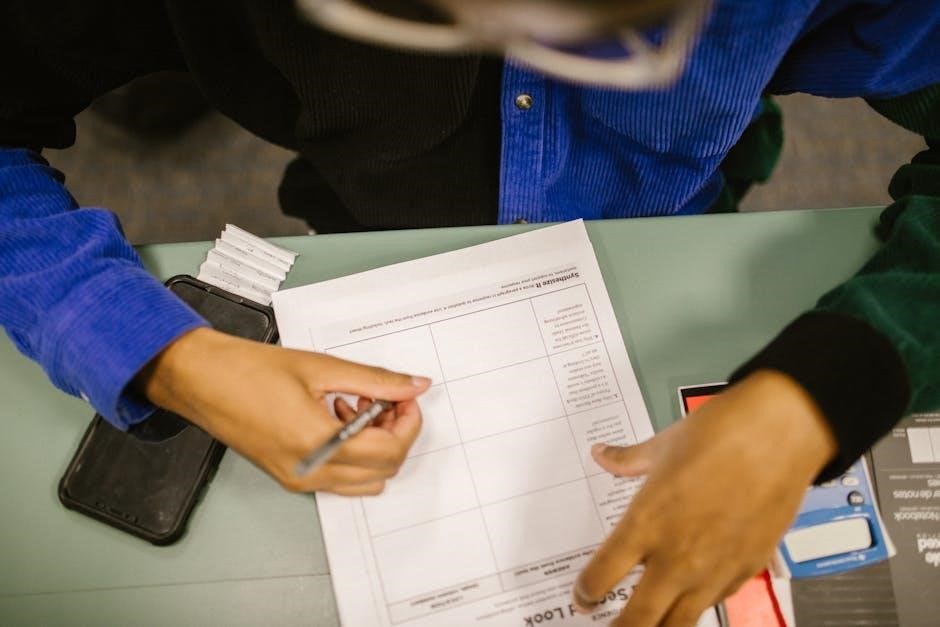A comprehensive guide to police exam preparation, offering practice questions, detailed answers, and insights into exam patterns to help candidates excel in their law enforcement entrance exams․
Overview of Police Exams
Police exams are standardized tests designed to assess a candidate’s aptitude, knowledge, and skills for law enforcement roles․ These exams typically include multiple-choice questions, true/false statements, fill-in-the-blanks, and scenario-based queries․ They evaluate general knowledge, legal procedures, reasoning, and physical ability․ The exams vary by jurisdiction but aim to ensure candidates meet the necessary standards for policing․ Preparation materials, such as previous years’ question papers and answer keys, are essential for success․ Candidates must demonstrate a strong understanding of law enforcement procedures, problem-solving skills, and current events to excel․ Proper preparation and practice are crucial for achieving a high score․
Importance of Practice Materials
Practice materials, such as previous years’ question papers and answer keys, are indispensable for police exam preparation․ They provide insights into exam patterns, question types, and content focus․ By solving these materials, candidates can identify strengths, weaknesses, and areas needing improvement․ Resources like UP Police Constable and Assam Police exam papers offer realistic practice, enhancing problem-solving and time management skills․ PDF guides and answer keys help candidates verify their responses, understand mistakes, and refine their strategies․ Regular use of these materials ensures a well-prepared and confident approach to the actual exam, significantly improving chances of success․
Structure of the Exam
The police exam typically consists of multiple sections, including general knowledge, legal procedures, and reasoning skills․ It often features 75-100 multiple-choice questions, with four answer choices, and a time limit of 1․5-2 hours․ Candidates must record answers on a scannable sheet․ Each question is weighted equally, and there is no negative marking․ The exam assesses knowledge of laws, problem-solving abilities, and current events․ Understanding the structure helps candidates allocate time effectively and focus on high-scoring areas, ensuring optimal performance and confidence during the test․

Types of Police Exam Questions
Police exams include multiple-choice questions (MCQs), true/false questions, fill-in-the-blanks, and scenario-based questions․ These formats assess knowledge, reasoning, and problem-solving skills․ Each type requires strategic preparation․
Multiple-Choice Questions (MCQs)
Multiple-choice questions (MCQs) are a common format in police exams, offering four options (A, B, C, D)․ They test knowledge on laws, procedures, and scenarios․ Candidates must select the correct answer, often under time pressure․ MCQs require strong analytical skills and attention to detail․ Practice with sample MCQs helps improve speed and accuracy․ Answer keys provide explanations, aiding in understanding mistakes․ Mastering MCQ strategies is crucial for achieving high scores in competitive police entrance exams․

True/False Questions
True/False questions are straightforward, requiring candidates to determine if statements are correct or incorrect․ They often test knowledge of legal procedures, current events, and general facts․ These questions are time-efficient, allowing quick assessments of a candidate’s understanding․ Answer keys provide clear correct/incorrect designations, aiding in self-evaluation․ To excel, candidates should thoroughly review study materials to avoid errors․ Consistent practice with sample True/False questions enhances accuracy and builds confidence for the actual exam․
Fill-in-the-Blanks
Fill-in-the-blanks questions require candidates to complete sentences or statements with missing words or phrases․ These questions assess knowledge of specific terms, procedures, and concepts․ They often focus on legal terminology, police protocols, or general knowledge․ For example, “The primary role of a police officer is to ______․” These questions are designed to test precise understanding and vocabulary․ To excel, candidates must thoroughly prepare by reviewing relevant study materials and practicing with sample questions․ Accurate and quick responses are critical for achieving high scores in this section․
Scenario-Based Questions
Scenario-based questions present real-life situations, requiring candidates to apply knowledge and reasoning skills․ These questions assess decision-making abilities and understanding of police procedures․ For example, “You witness a vehicle accident; what steps would you take?” Candidates must provide detailed, logical responses․ These questions evaluate practical application of training and protocols․ Proper preparation involves studying legal procedures, emergency response techniques, and ethical considerations․ Practice with sample scenarios enhances critical thinking and response accuracy, ensuring readiness for real-world challenges․ Effective time management is crucial for thorough answers, as these questions often require lengthy, well-structured responses․

Key Subject Areas Covered in Police Exams

Police exams cover general knowledge, law enforcement procedures, reasoning and problem-solving skills, and physical and medical standards to ensure candidates are well-prepared for the demands of the role․
General Knowledge and Current Events
Police exams include questions on general knowledge and current events to assess a candidate’s awareness of local, national, and international happenings․ This section often features multiple-choice or true/false questions about recent crimes, legal changes, or social issues․ For example, questions might focus on legislation updates, crime trends, or significant societal events․ Staying informed through newspapers, news portals, and official reports is essential for success․ This section evaluates a candidate’s ability to stay updated and understand the broader context of law enforcement, ensuring they are well-prepared to serve their communities effectively․
Law Enforcement Procedures
Police exams frequently include questions on law enforcement procedures, testing candidates’ knowledge of arrest protocols, evidence handling, and crime scene management․ These questions often appear as multiple-choice or true/false queries, requiring precise understanding of legal and procedural standards․ For instance, questions might ask about the proper steps during a traffic stop or how to process a crime scene․ Scenario-based questions also assess decision-making skills in real-world situations․ Familiarity with local laws and national policing standards is crucial for success in this section, ensuring candidates are prepared to uphold legal and ethical practices in their roles․ Regular practice with sample questions enhances comprehension and application of these procedures․
Reasoning and Problem-Solving Skills
Police exams emphasize reasoning and problem-solving skills to evaluate candidates’ ability to analyze situations and make sound decisions․ These questions often involve logical reasoning, pattern recognition, and deductive thinking․ For example, candidates may encounter scenario-based questions where they must determine the most appropriate course of action in a given situation․ Fill-in-the-blank and multiple-choice questions also test problem-solving abilities by presenting complex scenarios that require critical thinking․ Practicing with sample questions helps improve these skills, ensuring candidates can effectively address real-world challenges in law enforcement roles․ Strong reasoning skills are essential for success in both the exam and future policing duties․
Physical Ability and Medical Standards
Police exams include physical ability and medical evaluations to ensure candidates meet the fitness standards required for law enforcement roles․ These assessments typically involve vision tests, blood pressure checks, and physical tasks like running, push-ups, and sit-ups to gauge stamina and strength․ Medical exams verify overall health and suitability for duty․ Candidates must pass these tests to progress in the selection process․ Preparation for physical assessments is crucial, as they reflect the demanding nature of policing․ Regular exercise and a healthy lifestyle are recommended to achieve optimal performance in these evaluations․

Preparing for the Police Exam
Effective preparation involves using study guides, practice tests, and time management strategies to master exam content and improve performance․ Utilize recommended resources to build confidence and achieve success․
Study Materials and Resources
Essential study materials include previous year question papers, practice tests, and comprehensive guides․ These resources provide insights into exam patterns, helping candidates understand the content and improve their performance․ Utilizing PDF guides and online courses ensures access to updated information and expert tips․ Additionally, state-specific study materials, such as UP Police Constable or Assam Police exam papers, cater to regional requirements․ Leveraging these resources enables candidates to familiarize themselves with the exam format and strengthen their problem-solving skills effectively․ Regular practice with these materials is crucial for achieving success in the police exam․
Practice Tests and Mock Exams
Practice tests and mock exams are vital for assessing readiness and improving performance․ They simulate real exam conditions, helping candidates familiarize themselves with question formats and time constraints․ Mock exams cover diverse topics, such as logical reasoning, general knowledge, and scenario-based questions․ Regularly attempting these tests highlights strengths and weaknesses, allowing focused study․ Detailed answer explanations and scoring systems provide clarity on mistakes, enhancing learning․ Utilizing these resources builds confidence and ensures better preparation for the actual police exam, making them an invaluable tool for success․ Consistent practice is key to achieving optimal results․
Time Management Strategies
Effective time management is crucial for success in police exams․ Allocate specific time to each section based on question difficulty and personal strength․ Prioritize answering high-confidence questions first to secure maximum marks․ Avoid spending excessive time on a single question; flag it and revisit later if possible․ Practice mock exams to refine pacing skills and ensure all questions are attempted․ Utilize the remaining time to review answers and correct errors․ Stay calm and focused to maintain efficiency․ Mastering these strategies through consistent practice enhances overall performance and helps candidates achieve their best possible scores․
Understanding the Answer Key
The answer key is a vital resource for evaluating performance in police exams․ It provides the correct answers to all questions, enabling candidates to assess their scores accurately․ By comparing responses with the key, aspirants can identify strengths and areas needing improvement․ The provisional answer key is released post-exam, allowing candidates to raise objections if discrepancies are found․ Post verification, a final answer key is published, ensuring transparency and fairness․ Regularly reviewing answer keys helps candidates refine their preparation strategy and gain insights into common question patterns and exam trends․

Sample Questions and Answers
These questions and answers provide insights into typical police exam topics, helping candidates prepare effectively for their law enforcement entrance exams with real-life examples․
General Knowledge Questions
These questions assess a candidate’s awareness of current events, history, and social studies․ Examples include inquiries about significant historical events, geographical locations, and cultural trends․ The questions are designed to evaluate the applicant’s ability to stay informed and understand societal dynamics, which are crucial for effective law enforcement․ By practicing these questions, candidates can improve their knowledge and readiness for the exam․ Proper preparation ensures a strong foundation in this critical area of the police examination․
Legal and Procedural Questions
These questions focus on law enforcement procedures, criminal codes, and legal frameworks․ They test a candidate’s understanding of police protocols, arrest procedures, and evidence handling․ Examples include scenarios involving traffic laws, crime scene management, and constitutional rights․ Answering these correctly requires a strong grasp of legal principles and practical policing practices․ Candidates are advised to study state-specific laws and standard operating procedures to excel in this section․ Accurate knowledge ensures they can apply legal concepts effectively in real-world situations, making them proficient officers; Regular practice with sample questions enhances their readiness for the exam and future duties․
Logical Reasoning Questions
These questions assess problem-solving skills and the ability to make sound judgments․ They often involve deductive reasoning, pattern recognition, and logical conclusions․ Examples include identifying patterns in sequences, solving numerical puzzles, or drawing logical inferences from given statements․ Candidates must demonstrate critical thinking to arrive at the correct answers․ Practice with sample questions helps improve analytical abilities and time management, ensuring better performance in this section․ Regularly solving logical reasoning exercises enhances cognitive skills, which are essential for police officers to make quick, accurate decisions in high-pressure situations․ This section is crucial for evaluating a candidate’s mental agility and decision-making capabilities․
Personality Assessment Questions
These questions evaluate a candidate’s traits, behaviors, and emotional stability to ensure suitability for law enforcement roles․ They often include situational scenarios or statements requiring agreement/disagreement responses․ For example, questions may assess honesty, empathy, or decision-making under pressure․ Candidates are typically evaluated on their ability to remain calm, think clearly, and act ethically in challenging situations․ These assessments help identify individuals with the emotional resilience and moral integrity required for policing․ Regular practice with such questions can improve self-awareness and preparedness for real-life professional challenges․ This section is critical for determining a candidate’s long-term suitability for police duties․ Always answer honestly to reflect your true personality traits accurately․

Previous Years’ Question Papers
Access previous years’ question papers for UP Police Constable, Assam Police, and Delhi Police exams to understand exam patterns, practice effectively, and improve performance․ Available for years like 2024, 2023, and more to crack upcoming exams․
UP Police Constable Previous Year Papers
UP Police Constable previous year papers are essential study materials for aspirants․ These papers, available for years like 2024, 2023, and earlier, provide insights into exam patterns, question types, and recurring topics․ Candidates can download them in Hindi and English to practice and analyze their performance․ The 2024 exam, conducted in two phases, included questions on general knowledge, reasoning, and legal procedures․ Solving these papers helps in understanding the exam structure, improving time management, and identifying weak areas․ They also include answer keys, offering clarity on correct responses and examiners’ expectations․
Assam Police Exam Papers
Assam Police exam papers are crucial resources for candidates preparing for the constable and other ranks․ These papers, including memory-based questions from recent exams like 2022, cover a wide range of topics such as general knowledge, legal procedures, and reasoning․ They provide insights into the exam’s structure and question patterns, helping aspirants identify key areas to focus on․ Practicing with these papers enhances problem-solving skills and improves time management․ Additionally, they include answer keys, allowing candidates to evaluate their performance and understand the expected standards for success in the Assam Police recruitment process․
Delhi Police Exam Papers
Delhi Police exam papers are essential study materials for aspirants preparing for the constable and other ranks․ These papers include previous year’s questions, covering topics like general knowledge, legal procedures, and logical reasoning․ They provide valuable insights into the exam’s structure and question patterns, helping candidates identify key areas to focus on․ Practicing with these papers improves problem-solving skills and time management․ Additionally, they often include answer keys, enabling candidates to assess their performance and understand the expected standards for success in the Delhi Police recruitment process․
Other State Police Exam Papers
Other state police exam papers are crucial resources for candidates preparing for law enforcement exams across different regions․ These papers provide insights into the specific exam patterns, question types, and regional focus areas of various state police forces․ By practicing with these papers, candidates can familiarize themselves with the unique requirements and challenges of each state’s recruitment process․ They also offer a wide range of questions covering diverse topics, helping aspirants build a stronger foundation for their exams and improve their overall performance in competitive police recruitment drives nationwide․

Answer Keys and Solutions
Answer keys and solutions provide clarity on correct responses, helping candidates evaluate their performance․ They include explanations for complex questions, ensuring transparency in the evaluation process․
Provisional Answer Key for Police Exams
The provisional answer key is released shortly after the exam, allowing candidates to verify their responses․ It includes correct answers for all questions, enabling self-assessment․ Candidates can identify mistakes and gauge their performance․ This key is often published online, making it accessible to all applicants․ Additionally, it outlines the process for raising objections if discrepancies are found․ This transparency ensures fairness and builds trust in the examination system․ By reviewing the provisional key, candidates can better understand their strengths and areas needing improvement, aiding in future preparation strategies․ This resource is invaluable for aspirants aiming to refine their exam techniques and achieve higher scores․
How to Raise Objections
Candidates can raise objections to the provisional answer key by following the specified process․ Typically, this involves logging into the official exam portal and submitting objections online․ A deadline is set for raising objections, usually within a few days of the key’s release․ Candidates must provide evidence to support their claims, such as correct answers or relevant references․ The examining authority reviews all objections and updates the answer key accordingly․ This process ensures transparency and fairness, allowing candidates to challenge discrepancies and seek corrections before the final results are declared․ Adhering to the deadline is crucial to ensure objections are considered․
Final Answer Key and Results
The final answer key is released after considering all objections raised by candidates․ It serves as the definitive guide for evaluating responses, ensuring accuracy and fairness․ Results are declared based on the final key, with scores calculated by tallying correct answers․ Candidates can view their results on the official exam portal using their registration details․ The final answer key and results are crucial for determining eligibility for subsequent stages of the selection process, such as physical tests or interviews․ Transparency and precision are maintained throughout to ensure candidates’ trust in the exam system․

Selection Process and Eligibility Criteria
The selection process includes a written exam, physical efficiency test, medical examination, and interview․ Eligibility criteria vary by state but typically require meeting age, education, and physical standards․
Written Exam
The written exam is the first step in the police selection process, assessing candidates’ knowledge and aptitude․ It typically includes multiple-choice questions on law enforcement procedures, reasoning, and general knowledge․ Candidates must score above the cutoff to proceed․ The exam format varies by state but often covers topics like legal procedures, problem-solving, and current events․ Practice materials, such as previous year papers and mock tests, are essential for preparation․ Answer keys are released post-exam, allowing candidates to evaluate their performance․ Time management is crucial, as exams often have strict time limits and high competition․ Proper preparation ensures a strong foundation for success․
Physical Efficiency Test (PET)
The Physical Efficiency Test (PET) evaluates a candidate’s physical fitness and endurance, essential for law enforcement roles․ It typically includes tasks like running, push-ups, and long jumps, designed to assess strength, agility, and stamina․ Passing the PET is mandatory for advancing in the selection process․ Candidates are advised to engage in regular physical training to meet the required standards․ The test varies by state but generally includes standardized exercises to ensure fairness and transparency․ Proper preparation and practice are crucial to excel in this phase of the police exam process․
Medical Examination
The medical examination ensures candidates meet the physical and mental standards required for police duties․ It includes vision tests, blood pressure checks, and drug screenings to verify fitness․ Candidates must pass this exam to proceed in the selection process․ A clean bill of health is essential, as any disqualifying condition may result in elimination․ Proper preparation, such as avoiding substance use and maintaining overall wellness, is advised to clear this critical phase successfully and advance toward becoming a law enforcement officer․
Interview and Document Verification
The interview assesses a candidate’s suitability, communication skills, and problem-solving abilities․ It also verifies personal and professional background․ Document verification ensures all submitted documents, such as educational certificates, identification, and eligibility proofs, are authentic and meet the required standards․ Candidates must present original documents for scrutiny․ This step is crucial for final selection, as any discrepancy may lead to disqualification․ Proper preparation and ensuring all documents are in order are essential to successfully navigate this phase of the selection process and move closer to joining the police force․
Effective preparation and consistent practice with police exam questions and answers PDF ensure a strong performance․ Stay dedicated, utilize resources, and aim for success in your law enforcement career․
Final Tips for Success
To excel in police exams, focus on consistent practice with police exam questions and answers PDF․ Thoroughly review study guides, master time management, and understand answer keys․
Stay updated on exam patterns, and regularly solve mock tests to build confidence․ Prioritize weak areas and seek clarification on doubts․
Engage in physical training and ensure medical fitness․ Lastly, stay calm and focused during the exam to achieve optimal results․ Continuous dedication and strategic preparation are key to success․
Importance of Continuous Preparation
Continuous preparation is crucial for success in police exams, as it helps build confidence and mastery over police exam questions and answers PDF․ Regular study ensures familiarity with exam patterns, question types, and time management strategies․
By solving mock tests and previous year papers, candidates can identify weak areas and improve problem-solving skills․
Staying updated on current events, legal procedures, and reasoning techniques is equally vital․ Consistent practice and review are essential for achieving a high score and securing a position in the police force․
Stay Updated with Exam Notifications
Staying updated with exam notifications is essential for candidates preparing for police exams; Regularly checking official websites and notifications ensures awareness of exam dates, answer keys, and study materials․ Timely updates help candidates adjust their preparation strategies and stay informed about any changes in exam patterns or syllabus․
By following notifications, aspirants can access previous year papers and practice tests, aiding in better preparation․
Continuous monitoring of exam-related information ensures candidates are well-prepared and informed throughout the process․

